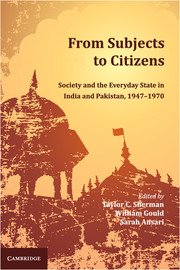Book contents
- Frontmatter
- Contents
- Acknowledgements
- Introduction
- 1 Personal Law and Citizenship in India's Transition to Independence
- 2 From Subjects to Citizens? Rationing, Refugees and the Publicity of Corruption over Independece in UP
- 3 Performing Peace: Gandhi's Assassination as a Critical Moment in the Consolidation of the Nehruvian State
- 4 Migration, Citizenship and Belonging in Hyderabad (Deccan), 1946–1956
- 5 Punjabi Refugees' Rehabilitation and the Indian State: Discourses, Denials and Dissonances
- 6 Sovereignty, Governmentality and Development in Ayub's Pakistan: The Case of Korangi Township
- 7 Everyday Expectations of the State during Pakistan's Early Years: Letters to the Editor, Dawn (Karachi), 1950–1953
- 8 Concrete ‘Progress’: Irrigation, Development and Modernity in Mid-Twentieth Century Sind
- 9 Partition Narratives: Displaced Trauma and Culpability among British Civil Servants in 1940s Punjab
- Contributors
- Index
Introduction
Published online by Cambridge University Press: 05 February 2014
- Frontmatter
- Contents
- Acknowledgements
- Introduction
- 1 Personal Law and Citizenship in India's Transition to Independence
- 2 From Subjects to Citizens? Rationing, Refugees and the Publicity of Corruption over Independece in UP
- 3 Performing Peace: Gandhi's Assassination as a Critical Moment in the Consolidation of the Nehruvian State
- 4 Migration, Citizenship and Belonging in Hyderabad (Deccan), 1946–1956
- 5 Punjabi Refugees' Rehabilitation and the Indian State: Discourses, Denials and Dissonances
- 6 Sovereignty, Governmentality and Development in Ayub's Pakistan: The Case of Korangi Township
- 7 Everyday Expectations of the State during Pakistan's Early Years: Letters to the Editor, Dawn (Karachi), 1950–1953
- 8 Concrete ‘Progress’: Irrigation, Development and Modernity in Mid-Twentieth Century Sind
- 9 Partition Narratives: Displaced Trauma and Culpability among British Civil Servants in 1940s Punjab
- Contributors
- Index
Summary
Today there are more states controlling more people than at any other point in history. Our world is shaped by the authority of the state. Yet the complexion of state authority is patchy and uneven. While it is almost always possible to trace the formal rules governing human interaction to the statute books of one state or another, in reality the words in these books often have little bearing upon what is happening on the ground. Their meanings are intentionally and unintentionally misrepresented by those who are supposed to enforce them and by those who are supposed to obey them, generating a range of competing authorities, voices, and allegiances.
The above-mentioned comment about the negotiated relationship between people and the states in which they live directly points to the importance of the interactions that ordinary citizens have with the state on an everyday basis. The chapters in From Subjects to Citizens accordingly engage with what is now a critical debate in the social sciences, namely the concept of the ‘everyday state’ and the various processes by which elite ideologies and institutions are interpreted, translated and manipulated at the quotidian level by men and women as they negotiate their lives. As their authors emphasize, the state in the context of newly independent South Asia did not operate as a uniform entity, but rather conducted its business in terms of specific networks of power and class structures that affected what it meant to different sets of interests.
- Type
- Chapter
- Information
- From Subjects to CitizensSociety and the Everyday State in India and Pakistan, 1947–1970, pp. 1 - 9Publisher: Cambridge University PressPrint publication year: 2014
- 1
- Cited by

